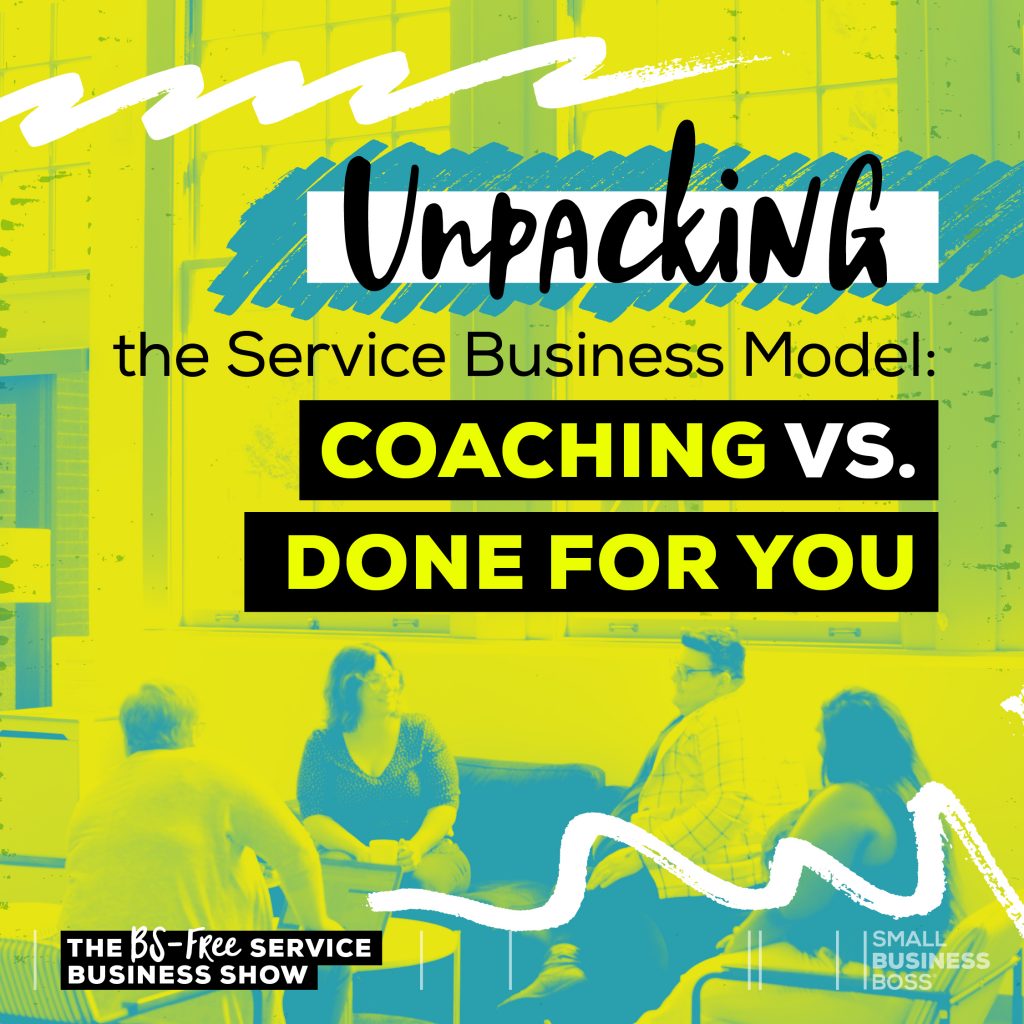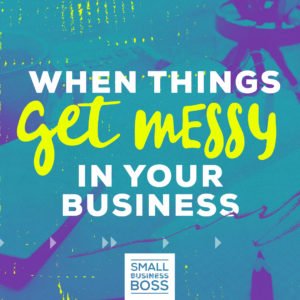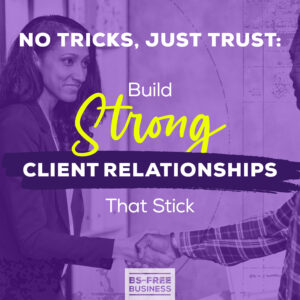
Search the site:
Unpacking the Service Business Model: Coaching vs. Done For You
When I think back to some of the worst advice I’ve received over the years, it came from people who didn’t understand how to run a creative, done-for-you service business. When we get our guidance from people who don’t get the nuances between different types of service businesses, we can find ourselves wasting time and energy in the wrong places. And frustration, well, it ensues as we’re not quite able to connect the dots.
In this episode, we’re looking at two very different types of services businesses and what’s involved with each one. We’re doing a deep dive into the differences between coaching and creative businesses.
Something I’ve talked about here on the show is how I feel like so much of the guidance out there about running a service business is rooted in the coaching world. The result is that many done-for-you, creative service business owners end up doing coaching as they’re being coached by people who don’t understand how creative businesses work.
The perfect example is how I see people pissing on proposals, when for many done-for-you service providers, it would make it simpler and easier for them to sell their services. This approach is very much rooted in a “sell your package” which at its heart, is more like coaching than bespoke services.
In this episode, I’m going to compare and contrast four big differences I see between coaching service businesses and those that offer done-for-you services. This distinction can be subtle, but it’s important, as the strategies and tactics you use should be dictated by the type of business you run.
As a caveat before we jump in, it’s important to note that these aren’t hard and fast rules. There will always be exceptions, but on the whole, these two types of business models run very differently. I’m reminded of this regularly as I see the differences between how we market, sell and serve clients with Scoop versus what we do for Small Business Boss.
What Your Clients Pay For
This is probably the most obvious distinction, which is around what you provide your clients with. With coaching, the deliverable is time with the coach, and during that time together you’ll get value through your interactions with them. They’ll help you create shifts through calls or other means of support.
That’s a very different deliverable than what you see from creative work, and it’s where things can get messy for those of you that offer services tied to deliverables. There’s typically a tangible output from a report to a piece of writing or a design. There’s a work product being created which is what your clients are paying you for.
This is why coaches are in the business of selling transformation when done-for-you service providers are in the business of selling the end result of your work together along with the deliverable. Depending on the service provided, it may be time saved, more money made, or simply the end product of a new logo or blog post.
That’s where the nuances are. And it’s a big reason why marketing needs to be different for each one.
A key difference for me is that with the Small Business Boss I’m selling way more of myself, so it’s more important that people know, like and trust me in a very different way. Our relationships are much more personal than they ever are with our agency clients.
On the agency side, as they’re coming to us for a specific deliverable, they care most about our experience and our process. The ‘like’ factor is definitely less important, and there’s not a lot of personal input that goes into those relationships. It may sound cold, but it’s the truth, and knowing those differences means our marketing shifts accordingly.
With a business that’s about coaching or consulting in a more intimate way, there’s more lead-up required, more nurturing, and a greater need for trust in our marketing. With done-for-you services, it really becomes about if we can do the job and deliver as promised.
With Small Business Boss, clients find us through the podcast and Instagram, which are much higher touch than the referrals and SEO we get clients through with the agency right now.
I’m not saying you need to be a robot if you offer done-for-you services, but you very likely don’t need to market in a way that requires you to build a personal brand. You may find you can take a more chilled approach to marketing focusing on only a few key places.
Selling Your Services
As I touched on earlier, I’m so very tired of people pissing on proposals. Proposals work. They’re a magic sales tool and people seriously underestimate their power.
A big difference in how coaches and done-for-you service providers sell their services is how they present the information.
Typically, a coach offers packages that are a set amount of calls and other forms of support. And don’t get me wrong, I love packages, they’re a great way to streamline and systematize what you offer so you’re not selling everything possible.
Packages are valuable for done-for-you services, but with a caveat. Yes, create services, productize them, define your process, decide what you do and don’t do…but keep in mind that not everything can be explained or sold on a sales page.
The idea that you should always be able to sell services from a sales page is a gross oversimplification taught by people who want to convince you that their solution is the way of doing things. And newsflash: many of these people have very limited experience running a service business and haven’t done so in years.
Truth? There are many situations for done-for-you service providers where having a package on your sales page isn’t enough. It’s doing you a disservice as people may need more information or context. After all, it’s harder to grasp a three-phase project than a six-month coaching package.
Yes, you can still have packages, but a proposal is a sales tool. It helps your services feel more custom, even if they’re not. Your potential clients want to feel like they’re going to be supported as you work together and your proposal can help you outline how you will make this happen.
Think about it this way. If you have all your “rules” for working together on a sales page, it’s likely going to be overwhelming. And when you offer done-for-you services, it’s critical that your potential clients know they can’t have 99 rounds of revisions. But a proposal can provide all the context for why they should choose you and how you work together in a clear and supportive way.
You can systematize your proposals to a point where very little customization is needed, but there’s enough that your potential client knows you get it.
A final word: A proposal can set you apart from the competition who can’t be bothered to do the little bit extra to woo the potential client.
How You Price Your Services
Next up is pricing. When it comes to coaching, setting prices is relatively simple as you’ve got a very defined package, so that pricing can be fixed.
Pricing your services with done-for-you services can be a little harder as not everything will be the same every single time. Even if you have a package, and even if your deliverables don’t shift that much, the pricing might.
Have you ever wanted to upcharge a potential client as you feel like they may be a pain in the ass? It’s super hard to do that when your price is set in stone, which is why with done-for-you-services, I’m not a fan of trying to shove everyone into a single option.
Sure, you can have a baseline pricing, but I also think you need to have room for customizing the price as needed.
This is a huge area where I see coaches who don’t really understand the nature of creative work doing their clients a disservice. Not everyone needs to have fixed pricing. Not everyone’s work can be constrained into a neat and tidy package every single time.
And you know what happens when you do that? You’re going to feel stuck, and if there’s anything creatives will rebel against, it’s being pushed into a box.
There’s absolutely a way to price your services so that they’re profitable without always having to have a fixed, inflexible price. For creative work with more potential points of failure, having the room to customize it as needed is critical.
And for the coaches listening that are feeling constrained by their pricing, I’d take some time to review if your price is working for you. Do you feel like you’re overservicing your clients? Does your time invested feel like a fair exchange? There are no hard and fast rules of how you have to do it, so maybe it’s time to revisit your prices or find a way to build in some flexibility where needed.
Getting to Know Potential Clients
For this last one, I may go a little sideways here. We need to talk about the fact that while discovery calls are totally normal in coaching, they’re a downright terrible idea for done-for-you service providers.
The idea behind a coaching discovery call is that you connect with someone so they get a sense of what it’s like to work with you. It’s essentially a free coaching session to see if you’re a fit.
Which works great for coaching as there’s literally just the time involved for coaching. And if you’re in the earlier stages of a coaching business this can be a solid way to find new clients.
For a done-for-you service provider the discovery call approach doesn’t work. You can’t write a post or design a graphic, so you end up giving away strategy on this call as a way to prove you know what you’re talking about.
In my experience, this is a slippery slope as you degrade the value of strategy, which should always be something that people pay for. Plus, I had way too many experiences when I was a freelancer where I’d talk content marketing and PR strategy and they’d say “great thanks, we’re going to do this in-house” –– they literally treated me like a free marketing hotline.
From there, I shifted to a model of doing calls only with clients who were serious. No more discovery calls where people could go fishing for what they needed. It may seem like a subtle distinction, but I moved to consult calls. As in, this is consultation to see how we can work together, and if you’re not ready to work together, it’s not the right time to talk .
Guess what? No more free strategy sessions, and people now pay me for my expertise.
This is a matter of positioning where any “consult” call-to-actions on my website are positioned as a way to discuss working together. When we get potential leads, We qualify them with both a “request a consult” form and then a follow-up email to ensure they have a budget.
If you’re not sure how these calls are working for you, an easy exercise is to start tracking them. How many calls have you had? How many have turned into clients? How much time have you spent?
If you find you’re spending time on calls and they’re not converting into paying clients, you likely need to reconsider your approach to calls and figure out how to make them work better for you.
Let Your Services Guide the Way
The moral of today’s episode is that not every service business is the same. Depending on what your services you offer, what you do should vary wildly. Learning the difference between generalized advice that’s more designed for a different type of service and what’s right for your specific offering is key.
Remember, if you’re a coach you’re not just confined to the way that celebrity entrepreneurs and coaches tell you to run your business. And if you’re a done-for-you service provider, I’d stop listening to advice from people who don’t actually run that type of business. If they’ve never actually done creative work or the type of offer you sell, I’d carefully consider if their guidance is valid.
I know for me, one of the best things I’ve done is to break-free from the advice of coaches who didn’t understand my business, and to focus on the basics of what I know work. It’s what I did for myself back in 2013 after wasting time launching a course, and it’s what I’m focused on here in 2021. The foundations matter, and while these things may seem obvious, there’s always a way to look at what you’re doing to ensure it’s the right choice for you and your business.

I’m Maggie Patterson (she/her), and services businesses are my business.
I have 20+ years of experience with client services, am a consultant for agency owners, creatives, and consultants, and vocal advocate for humane business practices rooted in empathy, respect, and trust.
Read or Listen to the Latest
For Solo Business Owners

Growing a solo service business is tough.
It’s even harder when you’re bombarded with BS advice that steers you away from your values and why you started your business in the first place.
This is the podcast for solo creatives and consultants who want to remain as a team of one and have zero interest in the hustle and grind of typical business teachings.
Subscribe now and never miss an episode.
For Micro Agency Owners
Most podcasts for agency owners obsess over revenue growth as the ultimate success metric.

But here’s the truth: not everyone wants to make millions. Your goal might be to build a sustainable business that lets you have a life and doesn’t run you into the ground.
Join me as I spill my shameless confessions and share everything I’ve learned about building a micro agency that skips the BS of tired and typical agency teachings.
Follow Now on All Major Podcast Platforms








